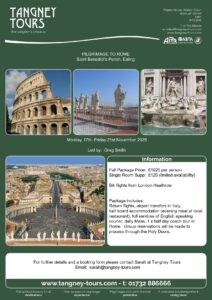Dear Parishioner,
In the Gospel today Jesus is asked “Is it permissible to pay taxes to Caesar or not?”
This was not a straight forward question. The Pharisees had been trying to trap Jesus and force him into a difficult position. If Jesus answered that taxes shouldn’t be paid, he’d be aligning himself with those who opposed paying the Roman tax. He’d be an agitator and could be denounced as fomenting a rebellion against the Romans. But if he answered yes that they should be paid, he’d be seen by some as a traitor to the Jewish cause and the Jewish religion.
Jesus neatly sidesteps the trap responding “Give back to Caesar what belongs to Caesar and to God what belongs to God”. Jesus’ message is that they should be less concerned about what belongs to Caesar and more about giving God what he is due, the fruits of their good work. So even though Caesar and the State have a role in their lives, this power is limited and does not replace God the Universal King.
Over time this phrase has been used by some to justify claims that religious leaders shouldn’t be interfering in secular areas like politics, economics and education. This is incorrect; at the heart of the gospel is the Christian call to love your neighbour, to take care of the sick, the poor and the needy. Therefore we Christians could say we are called to dual citizenship. We are citizens of the country in which we live, and we need to follow its laws and we benefit from the things it provides, such as health care, social care, education etc.
But we, as Christians, are also citizens of the Kingdom of God, and receive an abundance of gifts and benefits from being members of that Kingdom. From this it follows, that we also have certain obligations that we need to follow. In most cases the two responsibilities to State and to God do not conflict. But at times they may do and when that occurs, we should know immediately that our duty to God comes first.
Yours in Christ,





